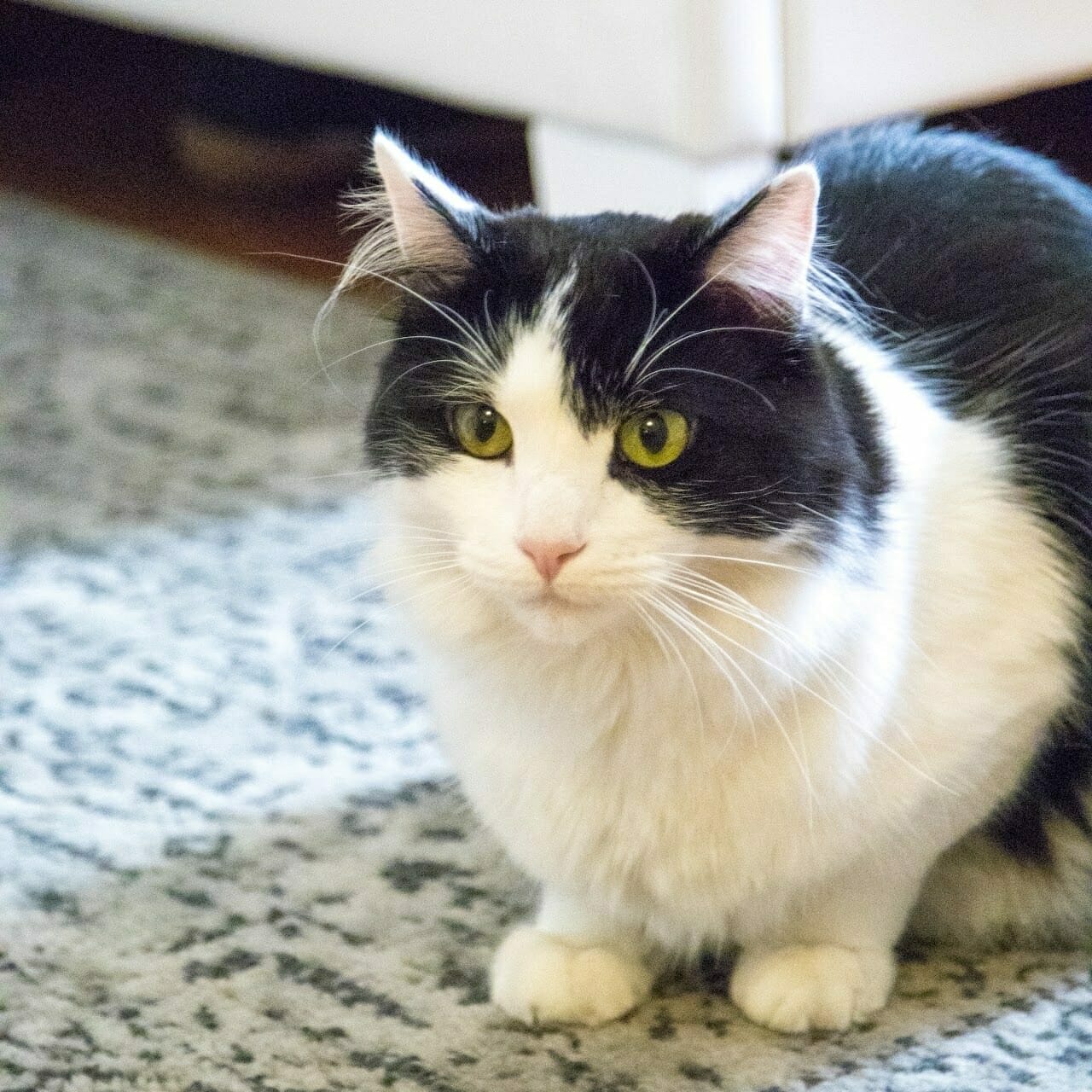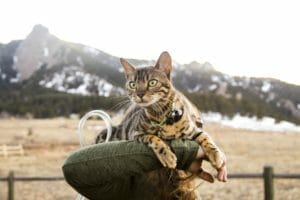Natural Remedies for Cat Digestion
February 23, 2023
Written By: Earth Buddy Team

If you’re a cat owner, you know that cats have unique digestive systems. Their bodies are designed to process different foods than yours, and they can’t digest some of the same foods you can. In fact, when cats eat the wrong foods, they can develop an upset stomach leading to problems within your cat’s digestive tract. Fortunately, there are several natural remedies to support your cat’s gut health.
A Cat’s Natural Diet
Cats are obligate carnivores, which means they need animal protein for nutrition. This is one reason why diets that are mostly grain-based are not a good idea for cats. Cats have a very limited ability to digest carbohydrates and starches, which include whole grains and vegetables.
Your cat’s diet should be grain-free and meat-based. A grain-free diet that is raw or homemade is recommended, but at minimum, meat should be listed as the first ingredient on the label in your cat’s food. This would mean meat should be the primary ingredient. Keep in mind, cat food brands that only use high-quality meat ingredients are less likely to contain fillers or other low-quality ingredients such as corn or wheat.
Although there’s nothing wrong with feeding your cat commercial dry food, it’s not always the best choice for them. Most dry food is high in carbohydrates and low in protein, which isn’t good for cats. It also lacks fiber, which can lead to digestive problems for your kitty.
The best way to keep your cat healthy is by feeding them real, whole foods instead of processed ones. If you want to give your cat wet canned food, make sure it’s high-quality and free of preservatives or artificial ingredients like corn syrup. If you choose to feed your cat a raw diet, consult with a nutritionist to determine how to develop a balanced bowl.
Watch for Food Allergies
Cats can be allergic to many different things, including food. Food allergies in cats are quite common and can cause a range of symptoms from mild to severe. Food allergies can be triggered by one particular food or a combination of foods.
The most common foods that cause food allergies in cats are fish and chicken; however, diets high in carbohydrates can also result in poor health. Cats with food allergies will often have gastrointestinal issues but they may also have problems with their skin. If you notice your cat itching and scratching their skin, especially if it’s frequent, it’s likely time to change their diet and get them on the path to better health.
If you think your cat might be suffering from a food allergy, it’s important to get the right diagnosis so you can find out which foods are causing the problem and avoid them in the future.
Natural Remedies for Cat Digestion
Cat digestion, or cat digestion problems, can be a serious health concern for your cat. Dry food is a common cause of digestive issues in cats, so it’s important to understand how it affects your cat’s digestive system and how you can help your pet if they have a problem with their digestive system. Here are some natural remedies for cat digestion you can implement into your feline’s routine.
Probiotics for Cats
Probiotics are beneficial bacteria that are found in your cat’s digestive system. Probiotics contain a source of live (viable) naturally occurring microorganisms to help support proper digestion and bowel health. The ‘good’ bacteria help maintain a healthy balance of good and bad microorganisms in the gut, which is important for overall health.
Probiotics for cats are the same as they are for humans. Probiotics can help your cat maintain good digestive health, which will in turn keep them feeling healthier overall. The main difference is that you will need to find a probiotic supplement that is specifically designed for them.
Additionally, probiotics are beneficial in that they:
- Assist in the digestion and absorption of essential nutrients
- Balance the cat’s intestinal microflora
- Promotes intestinal well-being
- Supports bacteria in the intestinal tract
If you want to use probiotics for your cat, it’s important to choose a supplement that is safe for their age and weight range, as well as appropriate for their condition. You should also follow the dosage instructions on your supplement label closely, because there can be significant differences in how much one cat needs compared with another cat of similar age and weight range.
Add Digestive Enzymes
Digestive enzymes are an essential part of digestion, helping your cat break down food in their digestive tract into smaller components that can be absorbed more easily by the body.
Enzymes are made up of proteins, which means they have a specific “shape” that fits with specific other proteins. When these enzyme molecules come into contact with their matching protein molecules, they help digest them. If a protein is missing its enzyme match, it doesn’t get digested properly and can cause problems in the gut.
Benefits of digestive enzymes include:
- Provides nutritional support for the gastrointestinal mucosa
- Promotes intestinal well-being
- Provides enzymes and factors necessary for proper digestion
This is why digestive enzymes are so important for cats and why it’s so important to choose the right kind of digestive enzyme supplement for your cat’s needs.
Mix in Colostrum

Colostrum contains many components that promote healthy inflammatory processes. These components include:
- Immunoglobulins: Antibodies that fight against disease-causing bacteria and viruses.
- Lactoferrin: An iron-binding protein that helps with nutrient absorption, supports the immune system, and helps support the growth of muscle, skin, collagen, bone, cartilage and nerve tissue.
- Lysozyme: An enzyme that kills harmful microorganisms such as bacteria and viruses; helps support the growth of muscle, skin, collagen, bone, cartilage and nerve tissue.
- Glycoproteins: Proteins with carbohydrate groups attached to them that support the immune system by stimulating B cells, a type of white blood cell, in order to produce immunoglobulins in response to invading pathogens or toxins.
When you give colostrum to your cat, your pet’s immune system reacts with it as if it were an infection or disease. This causes the body to produce more antibodies and other immune factors that attack specific pathogens and keep them from causing illness.
Additional benefits of colostrum include:
- Aids in reducing occasional loose stools due to environmental stress or changes in diet
- Helps maintain a healthy intestinal tract
- Helps support proper digestion and bowel health
Earth Buddy offers their Gut Health supplement combining both colostrum and full spectrum hemp extract for a combined approach. The bovine colostrum is sourced from Canada from cows that have not been provided antibiotics or growth hormones to allow optimal health benefits.
Herbal Remedies for Cats
Cat digestion is a sensitive process, and a poor diet can lead to digestive upset. The good news is that herbs can help restore balance and improve cat digestion. Here are some herbs that help:
- Fennel seed: Fennel seeds contain anethole, which has antispasmodic properties and can help relieve occasional gastric distress. They also contain anethol, which can help maintain proper digestive health.
- Ginger: Helps maintain a normal inflammatory response, contains antioxidants that help remove damaging free radicals.
- Marshmallow: Marshmallow contains mucilage, which is a stringy substance that coats the throat and digestive tract. It contains tannin and flavonoids (a group of antioxidants), which can help helps maintain a normal inflammatory response and supports vascular health.
- Slippery Elm: Has antioxidant properties and can supports a normal inflammatory response.
These natural herbs can be added to your pet’s diet when they are experiencing an upset tummy. Talk to your veterinarian before implementing any of the above herbs into your cat’s diet. You can also ask your veterinarian about feeding your cat a more bland diet through periods of gastric upset in addition to incorporation of the above remedies.
How to Read Your Cat’s Poop
There are several factors that can influence the color of your cat’s stool:
- Food. The color of your cat’s stool may change depending on what he eats. For example, if your cat eats grass, their feces may be greenish-yellow. If they eat meat and bones, their feces may appear to be brownish-red. If they eat grains, their feces will be yellowish-brown or tan in color.
- Stress. Stress can also affect the color of your cat’s poop. When cats are stressed or anxious, they may eat less and produce smaller stools with a light brown tinge in the middle of each one. A cat that is overly stressed may also exhibit occasional gastric distress. If you see this behavior in your cat, talk with your veterinarian about ways to reduce stress in your home environment and help them feel more secure again.
Take note of what your cat’s stool looks like when they’re feeling well without any digestive upsets. You should be able to tell when you clean your cat’s litter box. If anything looks abnormal or you are concerned about your cat’s tummy troubles, contact your veterinarian immediately.
How Often You Cat Poops
Cats have very different bowel habits than humans. They are much less likely to have intestinal tract issues, but when they do have these problems, they can be extremely serious. A healthy cat will poop once or sometimes twice a day in relatively small amounts. If your cat normally poops once or twice a day, but now only goes once every week or two, this could indicate that something is wrong with you cat’s system.
Using Natural Remedies
While it’s not always possible to utilize natural remedies, they may be implemented when possible to support your cat’s GI tract, and ultimately your cat’s health. If you’re interested in natural remedies while consulting with a veterinarian, you may want to consider a holistic or integrative approach to veterinary medicine for your cat.
For further reading, we recommend:
You Might Also Enjoy
Your dog’s skin is their largest organ making dog skin care a crucial part of…
Like us, our dogs, and other mammalian species, cats have an endocannabinoid system. This system…
Learning how to calm a dog down is an essential skill to have in your…



